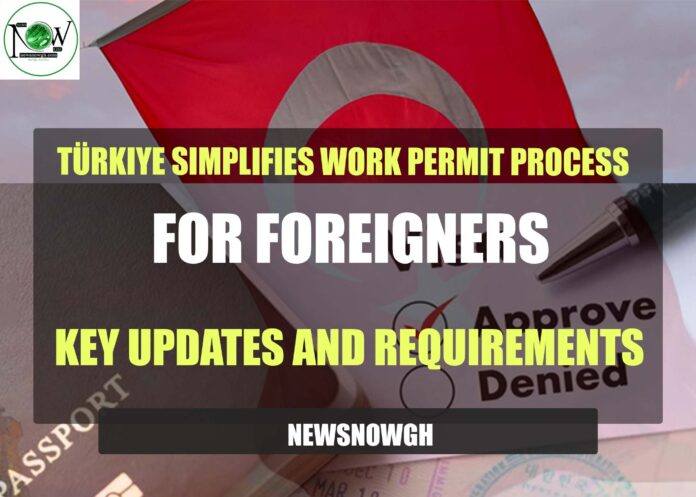Türkiye Simplifies Work Permit Process for Foreigners: Key Updates and Requirements
Foreign nationals can now work in Turkey more easily thanks to recent major revisions to the country’s work permit laws. Extended work permit exemptions for qualified workers, loosened regulations for refugees, and a simplified application procedure for all foreign workers are some of the major changes.
In an effort to solve labor shortages in several critical industries and draw in foreign talent, Turkey recently enacted a number of regulatory amendments. These changes, which have been published in the Official Gazette, aim to give foreign nationals and refugees more opportunity to contribute to the nation’s economy by streamlining the procedures for work permits.
With an emphasis on the three-year exemption term now accessible to talented foreign workers, this article offers a thorough overview of the new work permit exemptions.
Key Changes for Foreign Workers
Several reforms have been introduced by Turkey’s Ministry of Labor and Social Security to facilitate employment for foreign workers, refugees, and other eligible individuals. The new policies increase the length of time and adaptability of work permit exemptions for various groups:
1. Skilled Workers’ Three-Year Work Permit Exemptions
For a maximum of three years, skilled foreign workers who make substantial contributions to the Turkish economy, society, or technological sector are now permitted to work without a permit. These exemptions used to only last six months, but as of right now, qualified foreign workers are allowed to work in Turkey for up to three years without a permit.
Those who make substantial contributions to Turkey’s technological, social, or economic sectors are the focus of this change.
2. Exemptions for Temporary Protection Holders and Refugees
For specified periods, refugees and those in temporary protection in Turkey are no longer required to get a work permit. Registration in the Foreign Application, Evaluation, and Monitoring System is a prerequisite for eligibility. The duration and the conditions of these exemptions will be overseen by the Ministry of Interior.
3. Athletes and Journalists Have Special Exemptions
Certain professions are also given relief under the revised regulations:
Permanent Press Card Holders for Journalists
Work permit requirements are no longer applicable to foreign journalists who possess a permanent press card that has been authorized by the Presidential Directorate of Communications. This exemption is valid for the duration of their stay in Turkey, making it easier for the media industry to hire foreign experts.
Professional Athletes and Sports Personnel
Work permits are no longer necessary for athletes, coaches, and other sports-related employees who have contracts with Turkish sports federations or clubs. Additionally, the need for a special “sports-related visa” has been eliminated, which makes it simpler for international athletes to participate in Turkey’s thriving sports sector.
4. Foreign nationals can apply more easily
The removal of the rigorous 30-day window for applying for work permit exemptions after entering the nation is among the biggest changes:
Now, foreign nationals can request exemptions from work permits at any time while they are legally in Turkey. Due to the increased freedom this adjustment offers, international workers can now investigate job openings without feeling pressured to fulfill administrative deadlines.
Three-Year Work Permit Exemptions: Essential Information
For international experts hoping to work in Turkey, the three-year extension of the work permit exemption is revolutionary. Here’s a thorough examination of what this comprises:
Who Can Take Advantage of the Three-Year Exemption?
- Competent workers in fields that support the nation’s culture, technology, or economy.
- Employees in vital industries are experiencing a labor scarcity.
- Foreigners with experience in areas related to Turkey’s development objectives.
What Advantages Are There?
- Longer Validity: To give international workers greater stability, the exemption period has been extended from six months to three years.
- Greater Access: It benefits more skilled workers by including a greater range of industries and professions.
- Simplified Procedure: Qualified professionals can now get exemptions more easily and without the inconvenience of repeated renewals according to the new regulations.
How to Apply?
- Sign up for a foreign application, evaluation, and monitoring system account.
- Make sure you have the records you need to demonstrate your credentials and the applicability of your line of work.
- The official website of the Ministry of Labor and Social Security provides application guidelines.
Implications for Foreign Employees
The labor market in Turkey has advanced significantly as a result of these regulatory developments. The nation hopes to draw in and keep talented foreign workers by lowering work visa rules, which would spur innovation and economic growth. These modifications have various benefits for international employees:
- Simplified Procedures: Foreign nationals find it simpler to get work permits because of the shortened application process.
- Greater Flexibility: Both firms and employees benefit from the longer exemption periods for qualified workers and refugees.
- Increased Opportunities: Foreign workers now have more options in several Turkish economic areas thanks to the loosened laws.
Final Thoughts
With longer exemptions and fewer bureaucratic obstacles, Turkey’s loosened work permit regulations welcome qualified foreign workers. By addressing labor shortages and accelerating economic growth, these reforms hope to attract career-driven international workers to Turkey’s booming economy.
Follow us on Newsnowgh.com to stay updated on the latest information regarding work permits, visa application processes, paths to permanent residency, and visa-sponsored employment.


